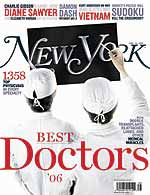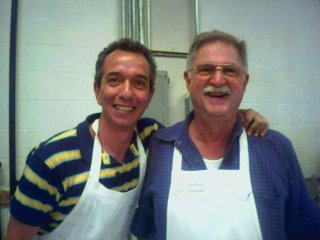Chains can be liberating--at least for people on the gluten-free diet. Knowing that Outback Steakhouse, Carrabba's Italian Grill, Bonefish Grill, Legal Sea Foods, P.F. Chang's and a slew of fast-food establishments offer gluten-free menus can ease trip planning as well as ordinary and business dining. It's especially reassuring to know that a restaurant has developed its gluten-free menu by working with a reputable outside organization, as is the case with the Gluten Intolerance Group and Outback, Carrabba's, and Bonefish Grill.
When I saw that the July 2006 Consumer Reports ranked dozens of chain restaurants according to reader surveys, I thought I'd share the results for restaurants with gluten-free menus. The highest score is an 88; the lowest is a 65. (See the magazine for more details.)
Carrabba's Italian GrillSo far Outback is the only one of the above five chains to establish a presence in New York City. However, among the magazine's top-ranked chains, several are already in The Big Apple. Even though they're not cheap, wouldn't it be great if they'd adopt gluten-free menus?
Score: 86
Taste: 5 out of 5
Service: 5 out of 5
Approximate Price: $20-24
Note: Carrabba's got special notice for takeout.
Bonefish Grill
Score: 85
Taste: 5 out of 5
Service: 5 out of 5
Approximate Price: $25-$29
Note: Bonefish Grill got special notice for "special occasions."
P.F. Chang's China Bistro
Score: 84
Taste: 5 out of 5
Service: 4 out of 5
Approximate Price: $20-$24
Note: P.F. Chang's got special notice for takeout but a "black eye" for crowds.
Legal Sea Foods
Score: 82
Taste: 4 out of 5
Service: 4 out of 5
Approximate Price: $25-$29
Outback Steakhouse
Score: 80
Taste: 4 out of 5
Service: 3 out of 5
Approximate Price: $20-$24
Note: Outback got special notice for takeout but a "black eye" for long waits.
GFNYC's List of Chains Ripe for Gluten-Free MenusIf you're aware of other celiac-friendly chains (those with gf menus), feel free to note them in the comments.
(All got top marks in Taste and Service)
The Capital Grille (Score: 88; $40 plus) already in NYC
Ruth's Chris Steak House (Score: 87; $40 plus) already in NYC
J. Alexander's (Score: 86; $20-$24)
Houston's (Score: 86; $25-$29) already in NYC
McCormick & Schmick's (Score: 85; $30-$39) already in NYC
Pappadeux Seafood Kitchen (Score: 84; $20-$24)
Morton's, The Steakhouse (Score: 84; $40 plus) already in NYC
ADDENDA
Two more cents....
First, I want to take note of the numbers. According to Consumer Reports, there are 779 Outbacks, 209 Carrabba's, 133 P.F. Chang's, and 108 Bonefish Grills. According to its website, Legal Sea Foods has more than 30 restaurants. So the effort to hammer out five gf chain restaurant menus yielded more than 1259 celiac-friendly restaurants--an average of about 252 restaurants per menu!
Second, because I'm budget conscious, I'll also take note of the seven "good food at a good price" restaurants listed by Consumer Reports--even though none has a New York City location at present:
Abuelo's Mexican Food Embassy (Score: 84; $15-$19)
Red Hot & Blue (Score: 82; $15-19)
Famous Dave's (Score: 82; $15-$19)
Claim Jumper (Score: 82; $15-$19)
Romano's Macaroni Grill (Score: 82; $15-$19)
Johnny Carino's Country Italian (Score: 81; $15-$19)
Texas Roadhouse (Score: 81; $15-$19)






